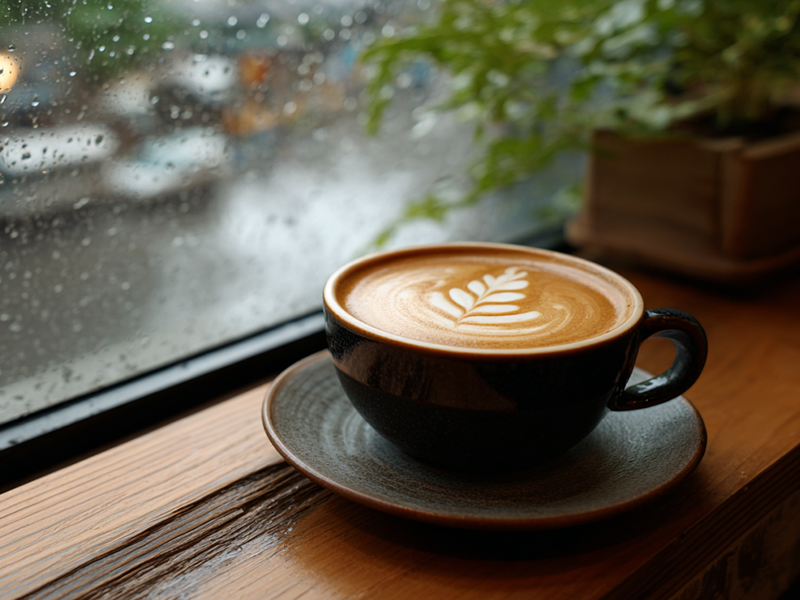By Katrin Krakovich, CEO & SEO Expert at Lahav Media
Your coffee shop serves amazing espresso, but when someone searches "coffee shop near me" at 7 AM, they're seeing your competitor instead. Sound familiar?
Here's the brutal truth: 73% of local searches happen on mobile, and if you're not showing up in those precious top three Google Maps results, you might as well be invisible. I've spent the last eight years helping coffee shops, cafes, and restaurants crack this code, and let me tell you what really works.
Why Most Coffee Shops Fail at "Near Me" Searches
Before we dive into solutions, let's address the elephant in the room. Most coffee shop owners think that great coffee automatically equals great visibility. I wish it worked that way.
The reality? Google's algorithm doesn't taste your cortado. It looks at three main factors for local ranking coffee shops in "near me" searches:
Relevance (how well your business matches what people search for) Distance (obvious, but there's more to it) Prominence (how well-known and trusted your business appears online)
Your amazing pour-over technique matters zero if Google doesn't understand what you offer or where you're located.

The Google Business Profile Foundation (Get This Right First)
Your Google Business Profile is your digital storefront. Mess this up, and everything else falls apart.
Complete Every Single Field
I see coffee shops leaving half their profile blank and wondering why they're invisible. Fill out your business hours, phone number, website, and especially your business description. Use natural language that includes "coffee shop," "espresso," "cafe," and your neighborhood name.
Categories Matter More Than You Think
Choose "Coffee Shop" as your primary category. Then add secondary categories like "Breakfast Restaurant," "Wi-Fi Spot," or "Bakery" if they apply. Each category gives you more chances to appear in different searches.
Photos That Actually Drive Traffic
Skip the generic stock photos. Upload real images of your space, your signature drinks, and yes, even your baristas at work. Google loves fresh, authentic content, and customers want to see what they're walking into.
I had one cafe owner tell me, "I don't have time for photos." Three months later, after adding weekly photo updates, their "near me" visibility jumped 40%. Time well spent.
Location Optimization Secrets Most Coffee Shops Miss
Here's where it gets interesting. Physical location matters, but so does digital location signals.
NAP Consistency (Name, Address, Phone)
Your business information must be identical everywhere online. Different spellings, old addresses, or wrong phone numbers confuse Google and hurt your rankings. I've seen coffee shops lose months of progress because they moved locations but left old addresses scattered across directory sites.
Neighborhood-Specific Content
Don't just say you're "downtown." Be specific. "Best coffee near Union Square," "Morning espresso in the Financial District," "Third-wave coffee in Brooklyn Heights." Google rewards businesses that clearly establish their local relevance.
Landing Pages for Different Locations
If you have multiple locations, create separate pages for each. Your Upper East Side location shouldn't compete with your SoHo shop for the same searches.

Reviews: The Make-or-Break Factor
Harsh reality check: 88% of people read online reviews before visiting a local business. Your review strategy directly impacts your "near me" search performance.
Quantity and Recency
Google favors businesses with fresh, consistent reviews. Don't just collect reviews when things go wrong, collect them when things go right. Train your staff to casually mention reviews during positive interactions.
Response to Every Review
Yes, even the good ones. A simple "Thanks for the five stars, Sarah! Hope to see you again soon" shows Google (and customers) that you're actively engaged.
The Review Recovery System
Bad reviews happen. How you handle them matters more than the review itself. Address complaints professionally, offer solutions, and show future customers how you handle problems.
Technical SEO for Coffee Shops (The Boring Stuff That Works)
Website Speed on Mobile
Your website needs to load fast on phones. Period. When someone's rushing to work and searching for coffee, they won't wait for your slow site to load. Use Google PageSpeed Insights to check your mobile speed.
Local Schema Markup
This is technical, but worth mentioning. Schema markup tells search engines exactly what your business is, where it's located, and what you offer. Most coffee shops skip this, giving you an easy competitive advantage.
Location Pages That Convert
Each location needs its own optimized page with specific address information, hours, directions, and unique content about that particular spot. Cookie-cutter location pages don't work.
Content Marketing That Drives Local Coffee Shop Traffic
Hyperlocal Blog Content
Write about your neighborhood, not just coffee. "Best morning routine in downtown Seattle," "Where to work remotely in the Mission District," or "Coffee and pastry pairings for rainy Portland days."
This approach works because you're catching people searching for neighborhood-specific information, then introducing them to your coffee shop naturally.
Social Proof Integration
Feature real customers and their stories. "Meet Maria, who writes her novel here every Tuesday morning" gives you content, builds community, and creates local relevance signals Google loves.
Paid Advertising That Actually Works for Local Coffee Shops
Google Ads for Local Intent
Focus on local modifier keywords: "coffee near me," "espresso [your neighborhood]," "best cafe [your city]." Avoid broad terms like "coffee" that waste budget on people across the country.
Facebook and Instagram Local Awareness Campaigns
Target people within a specific radius of your location. These campaigns are designed specifically for businesses like coffee shops that need foot traffic from nearby customers.
Retargeting Website Visitors
Someone visited your website but didn't come in? Show them ads on Facebook and Instagram for the next 30 days. Include current specials or new seasonal drinks.

Measuring Your "Near Me" Search Success
Track the Right Metrics
Don't just look at website traffic. Monitor Google Business Profile views, direction requests, and phone calls. These indicate local search intent better than generic traffic numbers.
Google Business Profile Insights
Check your insights monthly. Look for trends in how customers find you: direct searches (they know your name) versus discovery searches (they found you while looking for coffee generally).
Local Rank Tracking
Use tools like BrightLocal or SEMrush to track where you rank for local searches from different areas around your coffee shop. Your ranking can vary significantly based on the searcher's exact location.
Common Mistakes That Kill Coffee Shop Visibility
Ignoring Negative Reviews
I've seen coffee shops lose significant local ranking because they ignored bad reviews instead of addressing them professionally.
Inconsistent Business Hours
Nothing frustrates customers (and Google) more than showing up to a closed coffee shop that said it was open online. Keep your hours updated everywhere, especially during holidays.
Neglecting Off-Hours SEO
Your coffee shop might be busy during morning and afternoon rushes, but your online presence needs attention during slower periods. Use downtime to update your Google Business Profile, respond to reviews, and create content.
AI Search and the Future of Coffee Shop Discovery
Here's what most coffee shop owners aren't thinking about yet: AI-powered search results from ChatGPT, Google's AI overviews, and other AI tools.
When someone asks ChatGPT "What's the best coffee shop near me in Brooklyn?" your business needs to be mentioned in the training data and have strong online signals for AI to recommend you.
This means focusing on authoritative mentions in local publications, food blogs, and community websites. Traditional SEO helps, but AI search requires broader online presence and reputation building.
Your Next Steps to Coffee Shop "Near Me" Dominance
Start with your Google Business Profile. Complete every field, add fresh photos weekly, and create a system for collecting reviews.
Then focus on local content creation. Write about your neighborhood, engage with your community online, and build relationships with local food bloggers and community websites.
Remember, local search optimization isn't a one-time project. It's an ongoing process that compounds over time. The coffee shops winning "near me" searches today started this work months or years ago.
Your amazing coffee deserves to be discovered by people who will appreciate it. Local search optimization ensures it happens consistently, not just by accident.
Frequently Asked Questions

-p-500.jpg)
